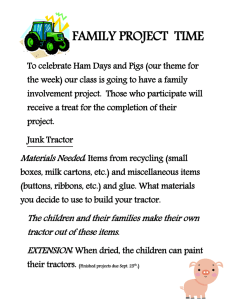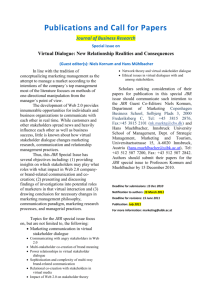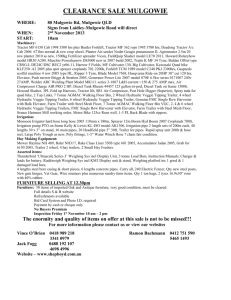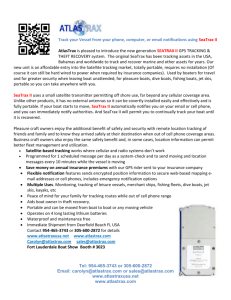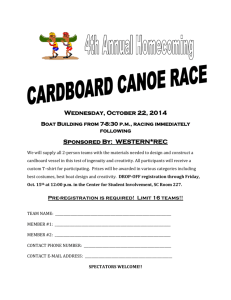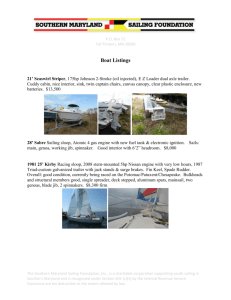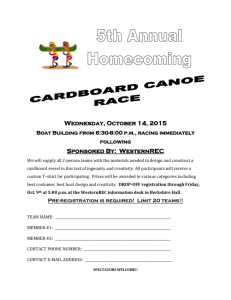Dec 2011 - Manawatu Microlight Club
advertisement
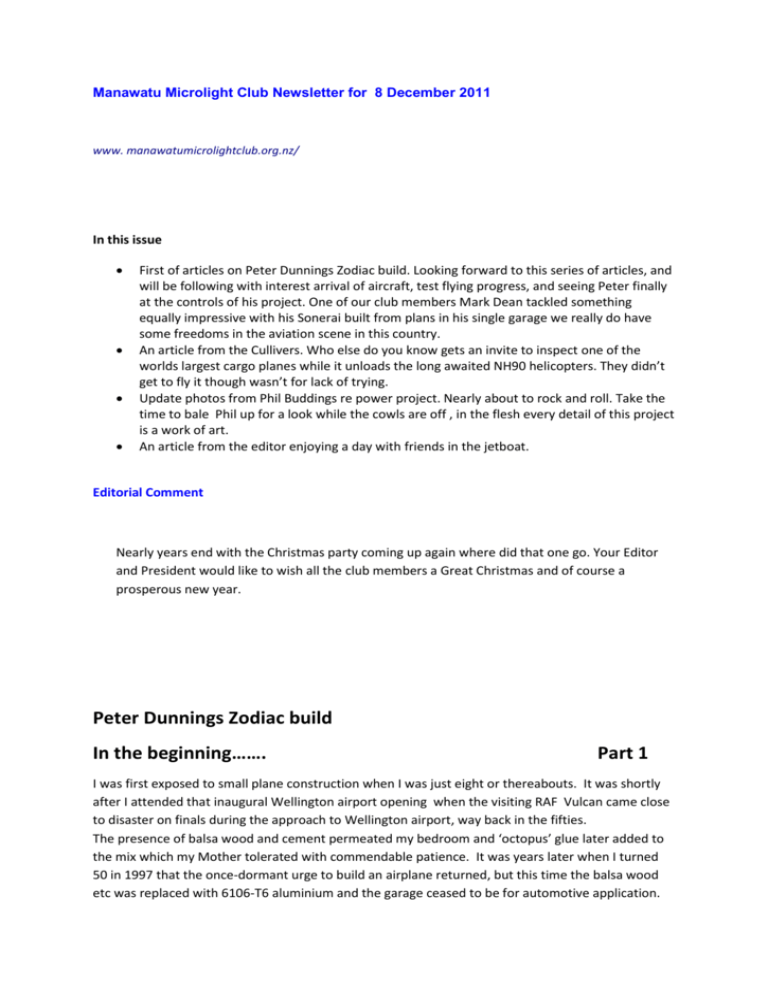
Manawatu Microlight Club Newsletter for 8 December 2011 www. manawatumicrolightclub.org.nz/ In this issue First of articles on Peter Dunnings Zodiac build. Looking forward to this series of articles, and will be following with interest arrival of aircraft, test flying progress, and seeing Peter finally at the controls of his project. One of our club members Mark Dean tackled something equally impressive with his Sonerai built from plans in his single garage we really do have some freedoms in the aviation scene in this country. An article from the Cullivers. Who else do you know gets an invite to inspect one of the worlds largest cargo planes while it unloads the long awaited NH90 helicopters. They didn’t get to fly it though wasn’t for lack of trying. Update photos from Phil Buddings re power project. Nearly about to rock and roll. Take the time to bale Phil up for a look while the cowls are off , in the flesh every detail of this project is a work of art. An article from the editor enjoying a day with friends in the jetboat. Editorial Comment Nearly years end with the Christmas party coming up again where did that one go. Your Editor and President would like to wish all the club members a Great Christmas and of course a prosperous new year. Peter Dunnings Zodiac build In the beginning……. Part 1 I was first exposed to small plane construction when I was just eight or thereabouts. It was shortly after I attended that inaugural Wellington airport opening when the visiting RAF Vulcan came close to disaster on finals during the approach to Wellington airport, way back in the fifties. The presence of balsa wood and cement permeated my bedroom and ‘octopus’ glue later added to the mix which my Mother tolerated with commendable patience. It was years later when I turned 50 in 1997 that the once-dormant urge to build an airplane returned, but this time the balsa wood etc was replaced with 6106-T6 aluminium and the garage ceased to be for automotive application. So what did it take to move airplane building from the “I wish I had” category to the “By gosh, I did it” column ? In the hopes of inspiring just one reader to make the same move, I’m going to describe how it came to pass for me…. Well I joined up with the Wellington microlight flyers group that year and finally got to fly at Masterton with the late Paul Havill and his syndicated challenger II ROTAX powered microlight. This followed an interesting presentation by Rex Kenny on one subsequent club evening which featured a Zodiac CH601UL being built in Tauranga at that time. I was hooked and this precipitated intense activity researching kit airplanes on the market ! Several features at that time drew me to the Zodiac. Firstly, the HD variant of the CH601 could take stresses almost double that of factory-built Cessna’s, and additionally it followed conventional aircraft in that it is made of durable aluminium. Those large chunky wings may result in a reduction of speed, but it more than makes that deficit up when it comes to climb and short-field performance. Throw in the excellent visibility for good measure, along with the ‘claimed’ short build time and the decision was complete for me. So you may now ask…what does it take to undertake building an aircraft (for the first time) for recreational purposes ? Well, I’d suggest that you ought to have had at least some experience in building something. As a kid I built radio kits and three houses as an adult, later. Having an interest in how things fit together , along with a taste of assembling something, are good indicators that you can get right into building an airplane (in my view). The more exposure, interest, and curiosity you have, the more eagerly you will look for ways to customise and improve on the airplane you’re constructing. Launching the Project Willing helpers on ‘kit arrival day’. My first step was to unpack and inventory all the sheet metal, formed parts, and plans etc. The 12 X 4 table I had built prior to kit arrival in the garage, left just sufficient room for me to walk around. On it I built the three components of the tail assembly, the wings, the centre section, and most of the rear fuselage. The table had been carefully set up. I still have the cut-off scraps from forming the rudder. The all-flying rudder took approx. 10 hours to assemble after which I had the most wonderful structure I had ever witnessed – an extremely strong air foil that only weighed a little over a kg. It became a hint of the elegance and integrity of stressed aluminium skin construction that ultimately characterised the whole plane. ie When completed it would weigh approx. 300kg which included the 100HP engine etc. Throughout the building process I paid considerable attention to detail – far more so than necessary - driven by pride in whatever level of craftsmanship I was able to muster. For example I carefully filed and sanded the corners edges of every metal piece, and afterwards treated the result with 2 pot primer. .. Over 90% of those corners & edges etc are forever hidden, but I have the satisfaction of knowing they were done right. NB. This is not to say that all my work was flawless, but when I made an error I agonised over it and resolved it either by confirming that it was very minor (eg uneven spacing between rivets) or correctable by making a replacement part ! The kit Supplier also stated that I was not building a 747 and this tends to put things in perspective (despite going to bed knowing something you did could have been done a little better !) Next in line for building was the assembly of the tail feathers. Having completed the rudder, I had experienced most of the processes required to build the entire plane (or so I thought !) – drilling, cutting, laying out, riveting, use of clecoes, priming etc. There was far more ‘character-building’ stuff to follow ! Directions for kit planes can vary between Manufacturers I was told. The kit manual I had to work with could only be described as ‘adequate’ although in more recent times they have reverted to CAD drawings, the latter of which provide pictorial views of details as they become pertinent in the building process. The drawings became the dominant source of information, rather than the sequence manual. The internet also was a source of supportive information too. But I digress…next came the wings The wings provided a significant challenge In that they required electrics to be fitted: Trim, strobes as well as the leading edge wing tanks. Sourcing the assembled tanks proved to be the best way forward and simplified construction as well. For cable ducting I used flexible, fire-resistant 19mm tubing…very effective. The full length ailerons had to be pre-warped prior to fitting to the wings and as they are hingeless (outer skin flexes)and they are bound to be a topic of future discussion. More in Part 2 …. Cullivers Article Working in our yard, as I now have a job (!), we hear the aircraft coming & going at Ohakea all day long. The air trainers we hardly notice. The new Augusta helicopters are wonderfully quiet. There's little better than hearing the putter-putter of the Tiger battle against a 2 knot headwind. Even the Spitfire came & beat up our strip last week. But yesterday a jet was coming in that didn't sound familiar. I watched to see what would appear. Pondering slowly on finals for runway 09 was an Antonov 124. I rushed into the house, yelled "Antonov" & the whole family piled out onto the patio to watch the lumbering beast. Later that evening, after a baby panic & rush to Palmy hospital (no dramas or worries, just a slightly elevated heart rate they wanted to check - another week to the due date), we got a text asking if we would like to go see the Antonov. - Too right! It is certainly a big aircraft, probably the biggest yet to get into Ohakea. It's almost as big as Sarah's bump! Standing in front of it was amazing, almost as great as standing in front of the Antonov, watching the turbine blades freewheeling in the breeze. It (the Antonov, not Sarah) had 4, yes, 4 nosewheels . We ran out of fingers and toes to count the main wheels, and that included the babies fingers & toes as well. The 17 Russian crew members, on their first visit to Manawatu had brought their fishing rods from Russia for the purpose of fishing on the Wanganui. I think biosecurity wasn't happy. And a couple of minibus loads of grumpy Russians weren't that impressed by the Manawatu, either. I got the feeling they'd rather get John Cleese to deliver the next NH90's! No sign of them having to pay their $5 departure tax. Sarah & I stood by as they extracted the step ladder, entered the belly & fired up the APU so we could see inside. The inside is simply cavernous. With 2 large 10 ton cranes running in the roof. It is all as you would expect from a soviet era cargo plane. Functional and strong. I wonder how many cans of bug spray bio-security used up. It does make me laugh. All the russians had to have all their bags x-rayed etc. But we, along with numerous others simply climbed on & walked around it. It was a great photo opportunity, with even the Spitfire making the trip across the apron to get it's pic taken next to the leviathan. The steps up to the cockpit were even steeper - hardly ideal for a 9 months pregnant woman. But Sarah wasn't going to let steps put her off. The flight deck was like the rest of the plane - massively functional. The 6 crew consisted of pilot & co-pilot. An ancient Garmin 420 GPS was crudely strapped to the glare-shield. 2 outboard motors faced the windscreen for some reason. The 2 navigators & 2 engineers sat behind the pilots. No glass screens or state of the art electronics in this aircraft. The upside was that we were allowed to sit where we wanted, take pics etc to our hearts content. The whisky compass was a N hemisphere one - though I can't imagine the russkies worrying about that. All the instruments were in russian, with a couple of paper conversion sheets for feet / meters / knots / km/hr were sellotaped here & there. We didn't see anything labeled as an auto pilot, but with 17 crew, maybe they simply take turns. But there again, it may simply have been in russian. But which crew member would control it, who knows? It is simply amazing to be in a cockpit of a plane that is stationary on the ground, and yet be far higher above ground level than we usually fly over the fence on landing! We were almost at the same level as the control tower! After the flight deck tour we got the tour of the avionics bay. I think this was a radar box of some kind, but it might have been an atomic bomb, a coffee machine, or a Russian version of an ELT, for all we knew. There was also an upside down periscope in the avionics bay for checking the cargo deck in flight as only the flight deck / avionics is pressurised. There were 17 crew members, so I presume 3 crews with a spare. They spend most of the year living full time on it! a couple of bunk beds & a small kitchen, not dissimilar to a super-tub with a hot plate catered to their needs. Some of the crew had spent 20 years flying the Antonov 124. The only place we didn't go to was the toilet - an amazing feat for Sarah at this stage of pregnancy. Descending the steep ladders again to terra firma & off to the control tower we went to watch it take off. More steps. We climbed more steps in one evening than in the whole of our time in NZ. Phillips got the power some update photos for out of towners. Aircraft detail Rans S9 ZK KOS Fully aerobatic Handling scary Jetboat article by Ed Every year the spring equinox arrives it turns people like me into a flight less bird and I get depressed. So when JBR suggested going jet boating down the Oroua River well I jumped at the opportunity. Hey I could already picture the scene Dark sunglasses, hat on backwards and the sound of a 350 chevy engine at full noise could be just as good if not better than doing power on stalls in the Arrow with boots in the back. John also invited Bill Penman along and he agreed to go Cool. It was a fairly snug fit in JBR ‘s ute on the way out to the river. We discussed the various launch options in the light of there wasn’t much water in the river and decided under the bridge at Awahuri would give us access to launch and enough water unlike the by the freezing works option which we had already been discarded. It would probably be fair to say I am bubbling with enthusiasm and keen to help however always the mind is running a bit faster than usual protecting one self from doing dumb shit in particular news worthy dumb shit that may end up in the news letter. Actually now is a good to present in a format for Pilots with relatively short attention spans the events which ended in Myself and Bill Penman sitting in the dark in Jamie Frecks ute with wet arses peering out for a couple of headlights towing a jet boat and another tractor. Some not all of the significant dumb moves Nearly burnt out JBRs clutch on his ute retrieving the trailer from the river (Ed) Took the wrong choice on a river fork 1.5 tonnes of jet boat on gravel shelf couple of hundred metres from useful river for jetboat (JBR) Walk back to Awahuri through LIC bull farm (Ed JBR Bill P) Drive to Feilding still a snug fit we haven’t lost any weight on our walk (Trio) Arrive at JBR’s place someone on site not happy, something about dinner commitment made not achievable now (Jane) Try to start tractor quite some time involved while all jump options tried Drive tractor Feilding to Awahuri (JBR) Boat trailer hits fence when Ute and trailer leaving JBR’s (Bill P Ed) Head off down the river in the tractor with boat trailer behind (Trio) Tow jetboat off gravel shelf to deep water (JBR) Try to start jet boat failed (JBR) Try to winch Jet boat onto trailer failed winch pin holding spline fell in river Try to get trailer to firm ground tractor stuck detach trailer Try to get tractor to firm ground-failed tractor stuck minus trailer 50 metres away. This is when JBR decides to call his long time mate Jamie Frecklington he may have a four wheel drive tractor around the corner. We are saved but he cannot get here until 7 o clock. What now another attempt is made to start the jetboat- failed. Lets fix the winch this we managed to do. We are on a roll now Pull the 1.5 Tonne jet boat against the current to the trailer it would have been a feat for young fellas and we were really tested to pull that one off however determination and team work won it over. Winch the jet boat on the trailer Stop Ring Jamie and tell him we don’t need him anymore. This was the beginning of the down hill slide. We got stuck quite a few times and JBR managed to skillfully drive out of it using the tractors bucket to assist but ended up with the jet boat almost floating in the river on the trailer and the tractor stalled and the river water over the drivers seat then we were buggered. Jamie and his farm manager turned up as promised just before dark with the four wheel drive tractor. Bill and I didn’t go back down river this time however apparently JBR had to dive under to detach the boat trailer during the retrieve. Finally after what seems like forever is that the sound of a tractor then the headlights yeah and then the sound of JBRs tractor I feel very lucky to be involved in the circle of friends I have in the aviation scene and when I look back at the adventures experienced with JBR Bill and Jamie fishing flying just hanging out. Back at work next week and during the day people ask “how was your weekend” to which I reply I “went Jet boating in my mates boat”. Their eyes light up “Jet boating eh”. To which I reply with a grin “yeah its tough being me”. Events Calendar. Christmas do Murrays Irish Bar Feilding 16 December order your meals before 1900 and tell Colin numbers please New Years day Fly in hosted Athol and Betty Woodville Committee First Monday of the month 7 pm. Getting spare prop for Hanuman All Club machines flying Looking for members to step up and fill some of the club positions due to be vacated next AGM Peter Gene has resigned from committee and we are looking for someone who will be keen to keep website updated.
